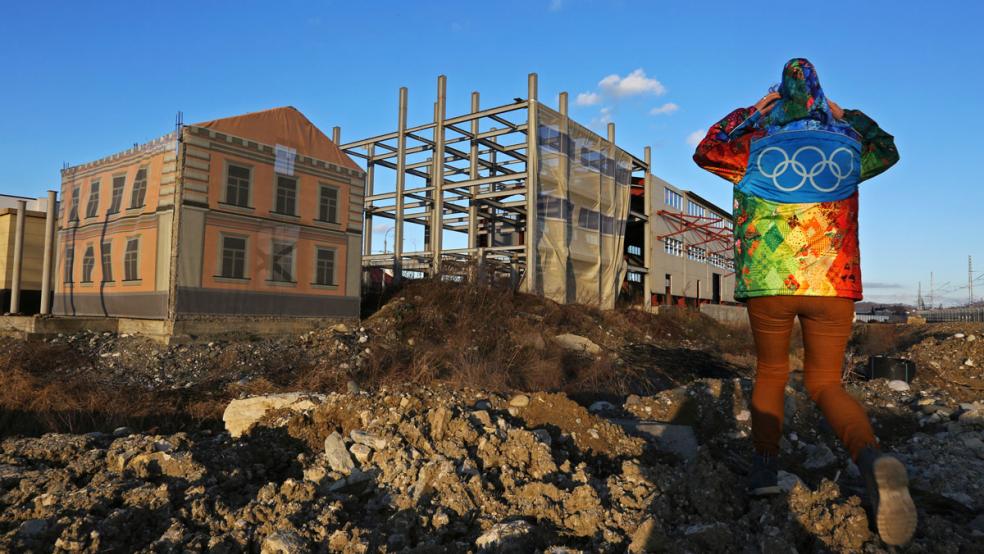The 2014 Olympic Games began in Sochi yesterday, with athletes taking part in preliminary heats in snowboarding, skiing and figure skating. But ahead of today’s opening ceremonies, the majority of attention is not on the athletes, but on Sochi itself.
Olympic host cities are always under scrutiny. The 2012 Summer Games in London were thought to be unsafe because of security failures, but they turned out to be among the most successful in history. The problems that Sochi has already revealed, however, go far beyond grumblings.
Related: The Ruthless Terrorists Targeting the Winter Olympics
Hotels are unfinished; stray dogs are roaming the streets; ski and snowboard jumps are too steep and have already caused one participant to injure himself in a crash that forced him to withdraw; venues aren’t finished; and plumbing in some sinks and toilets isn’t working.
Russian officials, for their part, are in denial over the problems, going as far as to blame Western media for the problems.
“We have surveillance video from the hotels that shows people turn on the shower, direct the nozzle at the wall and then leave the room for the whole day,” Dmitry Kozak, the deputy prime minister responsible for the Olympic preparation, told a Wall Street Journal reporter Wednesday, but was pulled away before he could be asked why there are surveillance cameras in hotel rooms.
Vladimir Yakunin, president of the national rail operator Russian Railways, the company that build much of Sochi’s infrastructure, also blamed the West.
Related: Olympics - How Safe Will American Athletes Be at Sochi?
“I'm very offended that the closer we get to the opening of the Olympics, the more hysteria around Russia becomes inflamed in the Western media," Yakunin wrote in a blog post Thursday, defending his firm’s work. "There's not a word about the quality of the Olympic facilities, about the fact that the level of readiness of the Olympic infrastructure has no analogues in the world."
The games are supposed to announce Russia’s return to superpower status and cement President Vladimir Putin’s legacy as one of Russia’s great leaders. Instead, the problems already uncovered in Sochi reveal many of Russia’s weaknesses. They are the same problems that plague Russia; a flashy, new exterior meant to project power but hiding an array of underlying problems.
Massive Corruption: Russia spent $50 billion on the games, making them the most expensive in history (to put that in perspective, 8 of the 14 former Soviet republicans - Azerbaijan, Estonia, Georgia, Turkmenistan, Moldova, Latvia, Armenia and Kyrgyzstan - all have GDPs smaller than that amount). Yet evidence is mounting that the companies paid to work on Sochi, which was a small resort town before the investment, didn’t do what they were paid to do. A lot of the money disappeared due to corruption. According to Deputy Prime Minister Boris Nemtsov, some $25-30 billion of the $50 billion spent has lined the pockets of Putin’s pals.
The same fleecing has been happening in Moscow since Putin rose to power. His friends got rich through the oil business, while his opponents were jailed, exiled or worse.
Related: U.S. Nukes - Our Turn to Catch Up to the Russians
Income Inequality: There are numerous reports on Sochi residents being displaced due to construction for the games. According to one report, a 58-year-old woman from outside of Sochi is now living in an aluminum shack because problems related to construction for the games caused her house to collapse. There are also reports of workers from Serbia and Bosnia-Herzegovina being deported without being paid.
In Putin’s Russia, these people are second-class citizens. In a country of 144 million, just 110 people own 35 percent of household wealth in Russia. And the vast majority of this wealth is held in Moscow and St. Petersburg, while the rest of the country lives close to poverty.
Human Rights Abuses: Putin has a long record of human rights abuses, from squashing political dissent to jailing rivals. But Russia’s homophobic culture is going to be front and center during the Olympics.
Under Russian law, it’s illegal for adults to educate children about homosexuality (what this means is open to interpretation). Russian authorities have used this law in the past to target gay rights groups, often with violence. The United States is sending gay athletes Billie Jean King and Caitlin Cahow as part of its official delegation to the games, putting Putin’s homophobia in the media spotlight. Speaking of the media…
No Freedom of the Press: There is no free press Russia. Outlets that oppose Putin are harassed, shut down by the government, or kicked out of the country. Some have even died under mysterious circumstances.
Unfortunately, Putin is not going to be able to limit the media at the Olympic games. Every part of the games, including Putin, the man who came up with the plan to use them as a showcase of Russia power, will be under scrutiny. If the news is bad, Putin will be powerless to stop it, and his plan to project Russian power could turn into an embarrassment.
Top Reads from the Fiscal Times:




